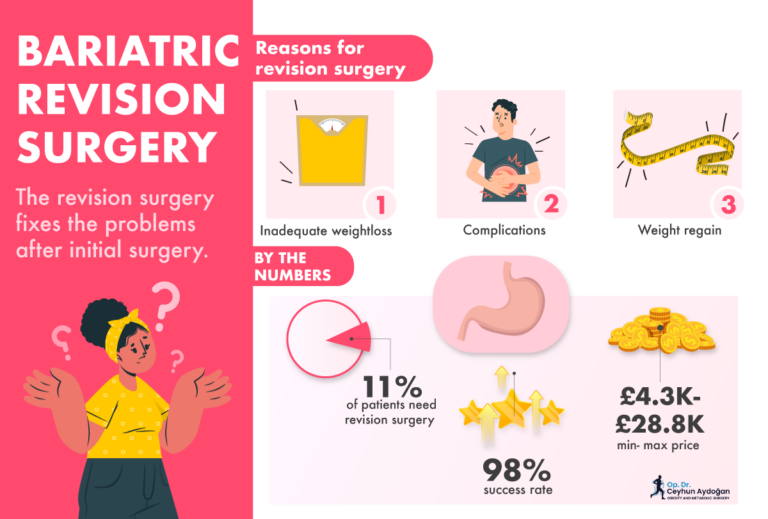Bariatric revision surgeries are the modification or adjustment surgeries for the initial bariatric procedure. It offers a second chance for patients who had various post-operative issues after their initial surgery, such as inadequate weight loss, regaining weight, or certain surgical complications.
There are various alternatives for revision surgery, depending on your previous bariatric surgery. The revision can be reversible, too, if the revision surgery is eligible to be reversed.
Pre-operational process and the recovery will be almost the same as your initial surgery process.
Here are some quick key points before you read:
- Bariatric revision surgery might be needed if you have a problem with the initial surgery.
- It can or cannot be reversed depending on which surgery you’ll be undergoing.
- The procedure is always more limiting than your previous surgery.
- It’s usually not a risky surgery even if it’s highly invasive.
- The average price of bariatric revisiın surgery is £16K.
Let’s get into the details for further information.
What is bariatric revision surgery?
Sometimes bariatric surgery patients find themselves having troubles after their procedure because of various reasons such as inadequate weight loss or various complications. Bariatric revision surgery gives a second chance for the correction of situations like these.
Of course, not everyone will have the same experience because we are all different from each other and so are our bodies. The revision surgery might be needed for two reasons; a surgical complication or having problems with following the post-op instructions. Regarding your situation, your doctor will suggest the most appropriate bariatric revision surgery for you.

In what situations is it needed?
There might be several occasions where revision bariatric surgery might be needed after the original procedure. Patients might be facing problems such as;
- NOT ACHIEVING THEIR WEIGHT LOSS GOALS
- REGAINING THE WEIGHT
- LOSING MUCH MORE WEIGHT THAN THE INTENDED AMOUNT
- DUMPING SYNDROME
- GERD (GASTROESOPHAGEAL REFLUX DISEASE)
- GASTRIC POUCH DILATION
- LAP-BAND EROSION
- STAPLE LINE PROBLEMS
These types of post-operative complications require bariatric revision surgery.
Can every bariatric revision surgery be reversed?
Whether a revision surgery can be reversed or not depends on the type of revision procedure itself. Types of revisional surgery that can be reversed are:
- GASTRIC BYPASS
- LAP-BAND
On the other hand, the not-reversible ones include:
- GASTRIC SLEEVE
- DUODENAL SWITCH (aka BP/DS)
- SADI-S
Your revision options and the procedure itself
Every bariatric surgery can only be revised by its own revision options. The revision surgery you need to undergo is decided regarding your previous bariatric surgery. So, these revisions are not one-size-fits-all; instead, they are carefully considered based on the patient’s current health, medical background, and weight loss goals.
Understanding the available options for bariatric revision can direct patients and medical professionals to make precise decisions. So with that in mind, let us explore various revision options and the procedures involved in each case:
| Initial Surgery | Revision Option |
| Mini Gastric bypass | Gastric bypass |
| Gastric Bypass | SADI-S |
| Gastric Bypass | Duodenal Switch |
| Sleeve Gastrectomy (Gastric sleeve) | Gastric Bypass |
| Sleeve Gastrectomy | Reseleeve procedure |
| Laparoscopic Adjustable Gastric Banding | Removal surgery |
| BPD/DS | SADI-S |
How is the procedure done?
Every bariatric revision procedure is different from one another. Here are the procedures and how they are done:
Gastric Reversion: The surgeon connects the parts of the stomach that were separated during the initial surgery. By doing so, they restore the stomach to its original anatomy. It’s an option for complications such as malabsorption or severe dumping syndrome after gastric bypass surgery.
Duodenal Switch: This procedure consists of the surgeon modifying the stomach pouch that was created in the first bypass surgery and reroutes the patient’s intestines to decrease calorie and nutrition absorption. It’s considered for patients who haven’t achieved satisfactory weight loss.
Sleeve-to-Gastric Bypass: In this procedure, the sleeve gastrectomy is converted into a gastric bypass by re-arranging the small intestine. This helps improve weight loss outcomes.
Lap-Band Removal: For those who have undergone laparoscopic adjustable gastric banding, a.k.a Lap Band, and experienced complications such as band erosion, slippage, GERD, dysphagia, leakage, etc, the band can be removed. Once it’s removed, you can explore other bariatric options with surgeons and their teams.
Is the revision surgery risky?
No, it’s very unlikely. However, as with any typical major surgical procedure, there might be some risks. Only, they might be different from the original surgery.
First of all, the patient that will undergo a revision surgery will also have to undergo a certain amount of anesthesia again. So, the waiting period between the two procedures must be arranged accordingly.
Secondly, some research stated, for instance, a band removal surgery, which is also a revisional procedure type, comes with the risk of irreversible inflammatory changes. This means that leakage can be more compared with primary surgery.
As for the afterward of the operation, the potential of regaining the weight is also likely. To prevent this, it is important to follow the instruction of your doctor. Because the risk of complications is not more than 9% if the surgeon has enough experience. That’s why it’s crucial to find an expert bariatric surgeon with a good team.
Can another surgeon do my revision surgery?
Yes, in most cases, another surgeon can do the revision surgery. However, it’s important to approach this with caution. You’ll want to find a surgeon who has experience in bariatric revision procedures. Before making up your mind, take your time to do the research about the surgeon. Remember that communication is key, so make sure to openly discuss your medical history, details of your initial surgery, and any complications you’ve experienced after the initial surgery. Also providing relevant medical records will help them plan the process.
What are the qualifications to get revision surgery?
A patient is qualified if experiencing one of these symptoms:
- INSUFFICIENT WEIGHT LOSS
- WEIGHT REGAIN
- GERD (GASTROESOPHAGEAL REFLUX DISEASE)
- DUMPING SYNDROME
- INITIAL SURGERY COMPLICATIONS
- STILL FEELING HUNGER
Feeling hunger means during the surgery, the surgeon did not remove the ghrelin hormone. This is a very unlikely situation. However, to understand if this feeling of hunger is psychological or hormone related, the patient needs to be examined ultrasonically.
Before and after revision surgery periods
Before undergoing any kind of bariatric revision surgery, it’s good to get informed about the preparation process and the recovery period after. So that individuals can be ready for significant changes. Because, while bariatric revision surgery offers a fixation, it is essential to comprehend the challenges and commitments involved in order to achieve long-term success.
Getting ready for the surgery: tests, pack your stuff, diet
To get ready for bariatric revision surgery, you’ll have to go through several steps, starting with a series of tests and evaluations.
Before the surgery date, patients can expect to undergo comprehensive medical assessments, including blood work, imaging scans, and cardiac evaluations, to ensure they are in the best possible condition for the procedure. For good measure, some psychological evaluations also may be necessary to make sure that the patient is mentally ready for the surgery.
The second step is to pack stuff that can be necessary for the time in the hospital and recovery period. You can pack comfortable clothes, underwear, toiletries, towels, and your medications if there are any. In some centers, it might be necessary for you to bring paperwork such as medical documentation and test results also.
Last but not least, a specific pre-operative diet plan can be a part of this period too if it’s suggested by your doctor. With this special diet, the aim is to reduce possible surgical mistakes by shrinking the liver. If you are dealing with health problems, this diet can be prepared to reduce your symptoms. It typically consists of low–carbohydrate and high-protein meals.
Recovery after surgery
The recovery period after the revision surgery is not going to be any different than the initial procedures. This means that the post-operative period requires patience and commitment to the instructions given by the medical team just like the former surgery. Right after the surgery, patients will stay in the hospital for monitoring. The duration depends on the bariatric revision surgery you underwent.
After returning home, you’ll start following your instructed diet which consists of liquids and pureed foods before reintroducing solid ones. This diet is important to allow the stomach to heal.
Another important factor during this period is light physical activity. To prevent any complications, walking is recommended to trigger circulation. As the healing period goes on, the body slowly adjusts to the changes. However, regular check–ups are vital in monitoring the progress and detecting possible complications that can happen during the recovery process.
What is the cost of revision surgery?
Depending on several factors, the revision bariatric surgery average cost can vary between £4,000-£28,000. Let’s get an overview of the minimum and maximum costs for various revision surgery procedures.
| Minimum Price | Maximum Price | |
| SADI-S | £12,000 | £25,000 |
| Duodenal Switch | £9,500 | £27,500 |
| Reseleeve Procedure | £7,000 | £12,500 |
| Gastric Sleeve | £6,500 | £25,000 |
| Laparoscopic Adjustable Gastric Banding | £4,200 | £16,400 |
| Gastric Bypass | £4,000 | £28,800 |
| Lap Band Removal Surgery | £4,200 | £13,300 |
First of all, the type of the specific revision surgery determines the complexity of it, so the cost can be higher accordingly. The surgeon’s experience and the location are also other factors that can affect the price range. The cost will generally don’t include pre-operative examinations, surgical fees, anesthesia, hospital stay, and follow-up care. But again, this can be different in every country.
Can I get insurance coverage for revision surgery?
In many cases, insurance companies can provide coverage if the revision surgery is considered medically necessary. Some plans may have specific conditions, for instance, a minimum amount of weight regain or a waiting period before approval. So, if the patient’s BMI is over 40, some insurance companies cover the price with a certain limit. To get this coverage, patients often need to provide documentation, including medical records, evidence of previous weight loss procedures, and the medical need for revision.
Other options for financing
When considering a revision procedure, there are several other options for financing to help manage the costs. Some financing companies have flexible plans with reasonable interest rates. With this in mind, not all but some clinics have deals with those financing companies so that it’s easier to access their assistance.
Although may not be a financing option, you can always give medical tourism a chance in order to make a budget. Although you need to search for doctors, their experiences, and clinics to get the best service.
Switzer NJ, Karmali S, Gill RS, Sherman V. Revisional Bariatric Surgery. Surgical Clinics of North America. 2016;96(4):827-842. doi:https://doi.org/10.1016/j.suc.2016.03.004
Shimizu H, Annaberdyev S, Motamarry I, Kroh M, Schauer PR, Brethauer SA. Revisional Bariatric Surgery for Unsuccessful Weight Loss and Complications. Obesity Surgery. 2013;23(11):1766-1773. doi:https://doi.org/10.1007/s11695-013-1012-1
Elnahas A, Graybiel K, Farrokhyar F, Gmora S, Anvari M, Hong D. Revisional surgery after failed laparoscopic adjustable gastric banding: a systematic review. Surgical Endoscopy. 2012;27(3):740-745. doi:https://doi.org/10.1007/s00464-012-2510-2
Langer FB, Bohdjalian A, Shakeri-Manesch S, et al. Inadequate weight loss vs secondary weight regain: laparoscopic conversion from gastric banding to Roux-en-Y gastric bypass. Obesity Surgery. 2008;18(11):1381-1386. doi:https://doi.org/10.1007/s11695-008-9479-x
ALEXANDROU A, SAKARELLOS P, DAVAKIS S, et al. Revision of Roux-en-Y Gastric Bypass for Inadequate Weight Loss or Weight Regain. In Vivo. 2021;36(1):30-39. doi:https://doi.org/10.21873/invivo.12673
Pinto-Bastos A, Conceição EM, Machado PPP. Reoperative Bariatric Surgery: a Systematic Review of the Reasons for Surgery, Medical and Weight Loss Outcomes, Relevant Behavioral Factors. Obesity Surgery. 2017;27(10):2707-2715. doi:https://doi.org/10.1007/s11695-017-2855-7

